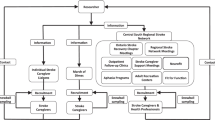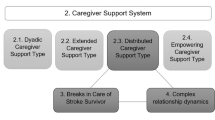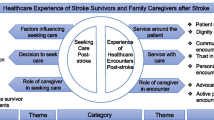Abstract
The rate of strokes in Africa, particularly among lower socio-economic classes, is increasing. The impact on long-term, informal caregivers of stroke patients is not known, as most research has focused on acute and discharge care. This study reports on the findings from a study of in-depth qualitative interviews with 20 caregivers to family members with stroke diagnoses in Lomé, Togo. Findings show that social, structural, and relational forces greatly impact the lives of informal caregivers. This study offers an understanding of the caregivers’ challenges through an intersectional framework which can be used to inform socio-economic, emotional, and health system supports for caregivers.
Similar content being viewed by others
References
Agyemang, C., Attah-Adjepong, G., Owusu-Dabo, E., Aikins, A. D., Addo, J., Edusei, A. K., Nkum, B. C., & Ogedegbe, G. (2012). Stroke in Ashanti region of Ghana. Ghana Medical Journal, 46, 12–17.
Akosile, C. O., Okoye, E. C., Nwankwo, M. J., Akosile, C. O., & Mbada, C. E. (2011). Quality of life and its correlates in caregivers of stroke survivors from a Nigerian population. Quality of Life Research, 20, 1379–1384.
Akosile, C. O., Okoye, E. C., & Odunowo, O. K. (2009). Carers’ burden in stroke and some associated factors in a South-Eastern Nigerian population. African Journal of Neurological Sciences, 28, 22–28.
American Stroke Association. (2020). About Stroke. https://www.stroke.org/en/about-stroke
Anderson, C. S., Linto, J., & Stewart-Wynne, E. G. (1995). A population-based assessment of the impact and burden of caregiving for long-term stroke survivors. Stroke, 26(5), 843–849.
Assogba, K. (2015). Epidemiology, risk Factors, type and outcome of stroke in health care facilities of Lomé, Togo: A prospective study. Science Journal of Public Health. https://doi.org/10.11648/j.sjph.20150301.15
Aziz, N. A., Pindus, D. M., Mullis, R., Walter, F. M., & Mant, J. (2016). Understanding stroke survivors’ and informal carers’ experiences of and need for primary care and community health services—a systematic review of the qualitative literature: protocol. BMJ Open, 6(1).
Badaru, U. M., Ogwumike, O. O., Adeniyi, A. F., & Nelson, E. E. (2017). Determinants of caregiving burden and quality of life of informal caregivers of African stroke survivors: Literature review. International Journal on Disability and Human Development, 16(3), 249–258.
Bessa, Y., Moore, A., & Amey, F. (2012). Caring for a loved one with cancer: It is my job. Journal of Psychosocial Oncology, 30, 217–238.
Brah, A., & Phoenix, A. (2004). Ain’t I a woman? Revisiting intersectionality. International Journal of Women’s Studies, 5(3), 75–86.
Brereton, L., Carroll, C., & Barnston, S. (2007). Interventions for adult family carers of people who have had a stroke: A systematic review. Clinical Rehabilitation, 21, 867–884.
Brewer, R. M. (1993). Theorizing race, class and gender: The new scholarship of Black feminist intellectuals and Black women’s labor. In S. James & A. Busia (Eds.), Theorizing Black Feminisms (pp. 13–30). Routledge.
Camak, D. J. (2015). Addressing the burden of stroke caregivers: A literature review. Journal of Clinical Nursing, 24, 2376–2382. https://doi.org/10.1111/jocn.12884
Charmaz, K. (2006). Constructing grounded theory: A practical guide through qualitative analysis. Sage.
Cordes, C. L., & Dougherty, T. W. (1993). A review and an integration of research on job burnout. The Academy of Management Review, 18, 621–656.
Crenshaw, K. W. (1988). Race, reform, and retrenchment: Transformation and legitimationin antidiscrimination law. Harvard Law Review, 101(7), 1331–1387.
Crenshaw, K. W. (1989). Demarginalizing the intersection of race and sex: A Black feminist critique of antidiscrimination doctrine, feminist theory and antiracist politics. University of Chicago Legal Forum, 139–168.
Crenshaw, K. (1995). Mapping the margins: Intersectionality, identity politics and violence against women of colour. In (Eds.), Critical Race Theory: The Key Writings that Informed the Movement (pp. 357–383). Stanford: The Stanford Law Review.
Cronin, A., & King, A. (2010). Power, inequality and identification: Exploring diversity and intersectionality among older adults. Sociology, 44(5), 876–892.
Edemekong, P. F., Bomgaars, D. L., Sukumaran, S., & Levy, S. B. (2020) Activities of Daily Living (ADLs). StatPearls. https://www.ncbi.nlm.nih.gov/books/NBK470404/
Ezejimor, M. C., Uthman, O. A., & Maduka, O. (2017). Stroke survivors in Nigeria: A door-to-door prevalence survey from Niger Delta region. Journal of Neurological Sciences, 372, 262–269.
Faigin, C., & Pargament, K. (2010). Strengthened by spirit: Religion, spirituality and resilience through adulthood and aging. In B. Resnick, L. Gwyther, & K. Roberto (Eds.), Resilience in aging: Concepts, research (pp. 163–180). Springer.
Gaugler, J. E. (2010). The longitudinal ramifications of stroke caregiving: A systematic review. Rehabilitation Psychology, 55, 108–125.
Geertz, C. (1973). The interpretation of cultures: Selected essays. Basic Books.
Global Health Observatory (GHO). (2016). http://apps.who.int/gho/data/node.cco
Greenwood, N., Mackenzie, A., Harris, R., Fenton, W., & Cloud, G. (2011). Perceptions of the role of general practice and practical support measures for carers of stroke survivors: A qualitative study. BMC Family Practice, 12–57.
Greenwood, N., Mezey, G., & Smith, R. (2018). Social exclusion in adult informal carers: A systematic narrative review of the experiences of informal carers of people with dementia and mental illness. Maturitas, 112, 39–45.
Hancock, A. (2007). Intersectionality as a normative and empirical paradigm. Politics and Gender, 3(2), 248–253.
Hankivsky, O. & Cormier, R. (2009). Intersectionality: Moving women’s health research and policy forward. Vancouver, BC: Women’s Health Research Network.
Hankivsky, O., Reid, C., Cormier, R., Varloe, C., Clark, N., Benoit, C., & Brotman, S. (2010). Exploring the promises of intersectionality for advancing women’s health research. International Journal for Equity in Health, http://www.equityhealthj.com/content/9/1/5
Imarhiagbe, F. A., Asemota, A. U., Oripelaye, B. A., Akpekpe, J. E., Owolabi, A. A., Abidakun, A. O., Akemokwe, F. M., Ogundare, V. O., Azeez, A. L., & Osakue, J. O. (2017). Burden of informal caregivers of stroke survivors: Validation of the Zarit burden interview in an African population. Annals of African Medicine, 16, 46–51.
Isaac, V., Stewart, R., & Krishnamoorthy, E. S. (2011). Caregiver burden and quality of life of older persons with stroke: A community hospital study in South India. Journal of Applied Gerontology, 30(5), 643–654.
Kangethe, S. (2010). Occupational care giving conditions and human rights: A study of elderly caregivers in Botswana. Indian Journal of Palliative Care. https://doi.org/10.4103/0973-1075.68409
Khedr, E. M., Fawi, G., Abdela, M., Mohammed, T., Mohamed, A., El-Fetoh, N. A., & Zaki, A. (2014). Prevalence of ischemic and hemorrhagic strokes in Qena Governorate, Egypt: Community-based study. Journal of Stroke and Cerebrovascular Diseases, 23, 1843–1848.
Koenig, H. G. (2002). Spirituality in patient care: Why, how, when, and what. Templeton Foundation Press.
Kpassagou, B. L., & Soedje, K. M. A. (2017). Health practitioners’ emotional reactions to caring for hospitalized children in Lomé, Togo: A qualitative study. BMC Health Services Research, 17, 700.
L’Institut National d’Assurance Maladie. (2016). Le système d’assurance maladie pratiqué par l’INAM conté aux professionnels des medias. http://news.alome.com/h/82074.html. Accessed February 14, 2018.
Lyons, J. G., Cauley, J. A., & Fredman, L. (2015). The effect of transitions in caregiving status and intensity on perceived stress among 992 female caregivers and noncaregivers. The Journal of Gerontology: Biological Sciences, 70(8), 1018–1023.
McGurk, R., & Kneebone, I. I. (2013). The problems faced by informal carers to people with aphasia after stroke: A literature review. Aphasiology, 27, 765–783.
Miles, M., & Huberman, M. (1994). Qualitative data analysis: An expanded sourcebook. Sage.
Morrow, M., Hankivsky, O., & Varcoe, C. (2007). Women’s Health in Canada: Critical theory, policy and practice Toronto. University of Toronto Press.
Olai, L. (2010). Life after a stroke event. With special reference to prognosis, health and municipality care utilization and life satisfaction among patients and their informal caregivers. [Dissertation, Uppsala University].
Pandian, J. D., Gandhi, D. B., Lindley, R. I., & Bettger, J. P. (2016). Informal caregiving: A growing need for inclusion in stroke rehabilitation. Stroke, 47(12), 3057–3062.
Patton, M. (1990). Qualitative evaluation and research methods. Sage.
Pearce, M. (2005). A critical review of the forms and value of religious coping among informal caregivers. Journal of Religion and Health, 44(1), 81–115.
Pearce, M. J., Medoff, D., Lawrence, R. E., & Dixon, L. (2016). Religious coping among adults caring for family members with serious mental illness. Community Mental Health Journal, 52(2), 194–202.
Pickle, L. M., Mungiole, M., & Gillum, R. F. (1997). Geographic variation in stroke mortality in Blacks and Whites in the United States. Stroke, 28, 1639–1647.
Reed, P. G. (1987). Spirituality and well-being in terminally ill hospital adults. Research in Nursing & Health, 10(5), 334–335.
Rombough, R. E., Howse, E. L., Bagg, S. D., & Bartfay, W. J. (2007). A comparison of studies on the quality of life of primary caregivers of stroke survivors: A systematic review of the literature. Top Stroke Rehabilitation, 14, 69–79.
Sacco, R. L., Boden-Albala, B., Gan, R., Chen, X., Kargman, D. E., Shea, S., Paik, M. C., & Hauser, W. A. (1998). Stroke incidence among White, Black, and Hispanic residents of an urban community: The Northern Manhattan Stroke Study. American Journal of Epidemiology, 147(3), 259–268.
Salter, K., Zettler, L., Foley, N., & Teasell, R. (2010). Impact of caring for individuals with stroke on perceived physical health of informal caregivers. Disability and Rehabilitation, 32, 273–281.
Simien, E. (2007). Doing intersectionality research: From conceptual issues to practical examples. Politics & Gender, 3(2), 264–271.
Stroke Association. (2013). Feeling overwhelmed. The emotional impact of stroke. Stroke Association.
Taylor, Y. (2009). Complexities and complications: Intersections of class and sexuality. Journal of Lesbian Studies, 13, 189–203.
Van de Vijver, S., Akinyi, A., Oti, S., Olajide, A., Agyemang, C., Aboderlin, I., & Kyobutungi, C. (2013). Status report on hypertension in Africa- Consultative review for the 6th session of the African Union Conference of Ministers of Health on NCD’s. The Pan African Medical Journal, 61, 38.
Versey, S. H. (2017). Caregiving and women’s health: Toward an intersectional approach. Women’s Health Issues, 27(2), 117–120.
Walker, R., Whiting, D., Unwin, N., Mugusi, F., Swai, M., Aris, E., Jusabani, A., Kabadi, G., Gray, W. K., Lewanga, M., & Alberti, G. (2010). Stroke incidence in rural and urban Tanzania: A prospective, community-based study. The Lancet Neurology, 9(8), 786–792.
Walker, R. W., Jusabani, A., & Aris, E. (2011). Post-stroke case fatality within an incident population in rural Tanzania. Journal of Neurology, Neurosurgery, and Psychiatry, 82, 1001–1005.
Weber, L. (2005). Whose questions, what evidence, which practice? Feminist intersectional challenges to traditional biomedical approaches to health disparities in Philadelphia: Invited Presentation, Annual Meeting of the American Public Health Association 2005.
Weldon, L. (2008). Intersectionality. In G. Geerty & A. Mazur (Eds.), Politics, Gender, and Concepts (pp. 193–215). Cambridge University Press.
White, C. L., Lauzon, S., Yaffe, M. J., & Wood-Dauphinee, S. (2004). Toward a model of quality of life for family caregivers of stroke survivors. Quality of Life Research, 13, 625–638.
World Bank (2018). Togo – Overview. http://www.worldbank.org/en/country/togo/overview
World Health Organization. (May. (2014). Togo: Country Cooperation Strategy. Switzerland.
Zerai, A. (2000). Agents of knowledge and action. Cultural Dynamics, 12(2), 182–222.
Author information
Authors and Affiliations
Corresponding author
Ethics declarations
Conflict of Interests
All authors declare no conflict of interest.
Informed Consent
None.
Ethical Treatment of Experimental Subjects (Animals and Humans)
No experimental treatment was conducted on either human or animal subjects in this study.
Additional information
Publisher's Note
Springer Nature remains neutral with regard to jurisdictional claims in published maps and institutional affiliations.
Rights and permissions
About this article
Cite this article
Moore, A.R., Yaa Owusu, A., Moore, S. et al. Caring for a Loved One with Stroke in Lomé, Togo: an Intersectional Framework. Ageing Int 47, 743–757 (2022). https://doi.org/10.1007/s12126-021-09427-9
Accepted:
Published:
Issue Date:
DOI: https://doi.org/10.1007/s12126-021-09427-9




